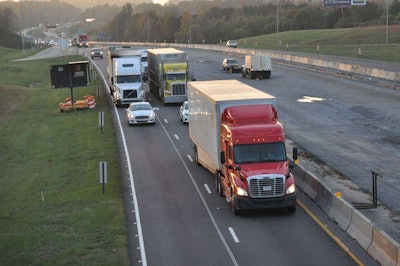 The Denham Amendment was heavily backed by the American Trucking Associations, Western State Trucking Association and the Truckload Carriers Association. OOIDA and the Teamsters oppose the move.
The Denham Amendment was heavily backed by the American Trucking Associations, Western State Trucking Association and the Truckload Carriers Association. OOIDA and the Teamsters oppose the move.The U.S. House on Thursday voted to add a provision to a broader legislative package that seeks to reassert the federal government’s authority in managing truck drivers’ work schedules and to protect carriers from court-ordered payouts to drivers.
The so-called Denham Amendment, offered by Rep. Jeff Denham (R-Calif.) and two other lawmakers, would exempt carriers from complying with state laws that require employers to provide paid meal and rest breaks employees. It also prevents states from “imposing any additional obligations” on carriers whose driver employees work under federal hours of service rules.
The full House is expected to vote on the bill to which the amendment was added, the Federal Aviation Administration reauthorization bill, on Friday. For the measure to become law, it must be passed by both the House and the Senate and signed into law by the president. The House has well outpaced the Senate on work on an FAA bill, but the American Trucking Associations said Thursday it expects the two chambers to begin negotiations on the bill within the next month.
The Denham provision, officially titled the Federal Authority provision, is heavily backed by the American Trucking Associations, the Western States Trucking Association and the Truckload Carriers Association. The groups say Congressional action on the issue became necessary in recent years following a string of court decisions that violated the spirit — or even the letter — of the 1994 Federal Aviation Administration Authorization Act, which includes a provision prohibiting states from enacting laws that interfere with a “price, route or service” of a motor carrier.

Backers of the Denham Amendment argued that court decisions upholding states’ rights to enforce meal and rest break laws for truck drivers eroded the authority of the 1994 FAAAA (F4A) law. While most of the attention on the Denham Amendment is focused on California state laws, and court decisions stemming from California-centered litigation, the provision would ward off attempts by other states to enact similar laws, its backers say. ATA’s Bill Sullivan said last year the Denham Amendment would prevent a “patchwork of regulations” that could arise by state-to-state pay reforms that “needlessly complicates the lives of millions of professional drivers.”
Likewise, Joe Rajkovazc of the Western States Trucking Associations said the Denham provision would protect carriers from a wave of lawsuits related to state initiatives to require carriers to pay drivers for non-driving time or even off-duty time. The amendment will “[prohibit] states from involving themselves in the compensation methods in which drivers are paid,” he said last year. “Once one of the cases are successfully litigated, all the ‘me-too’ lawsuits start focusing on much smaller motor carriers downstream. It becomes legal blackmail against a small business: ‘Pay us or get sued and taken into court.’”
Rajkovacz cites a 2016 court decision that ordered Walmart’s private fleet to pay drivers more than $60 million in back wages for mostly time spent off-duty and in their sleeper berths, he says. “Almost all money awarded (in the Walmart case) was to drivers sleeping in their bunks.”
States “think employers should be paying a driver for off-duty time that is mandated by federal rules,” he added.
Carriers could still allow paid breaks if they choose, should the Denham Amendment ultimately become law. But they wouldn’t be required to by states.
Opponents of the Denham rule, including the Teamsters Union and the Owner-Operator Independent Drivers Association, contend the measure would halt attempts at the state-level to institute pay reforms for drivers, such as mandated detention pay.
Denham’s Amendment was one of three trucking-related amendments up for consideration for the FAA bill. An amendment that could have allowed the Federal Motor Carrier Safety Administration to move more quickly on hours of service reforms was withdrawn before it could be considered (see Overdrive coverage of that amendment at this link). Another amendment, which would set basic criteria for which brokers and shippers should use when hiring carriers, is expected to be brought to the floor Friday for consideration.











